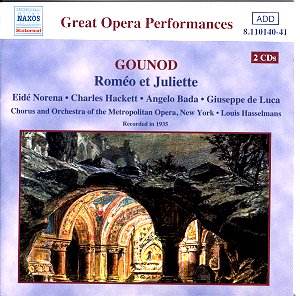It is a truly remarkable thing, that Gounod’s
‘Roméo et Juliette’ never had a complete recording on 78s.
Unlike other staples of the French repertoire which were enshrined
in recordings which have become classics (such as the early version
of Massenet’s ‘Manon’, the Vallin/Thill ‘Werther’), ‘Roméo
et Juliette’ had to wait until the post-war period for its recording.
So this set, taken live from the Metropolitan Opera in 1935, is
a valuable record. The cast, though perhaps not completely vintage,
is never less than interesting. One can regret that we have no
complete version from some of the other great names associated
with the work, particularly the Francophone ones such as Heldy,
Feraldy and Thill.
The cast is led by the Norwegian, Eide Norena.
From 1928 she was based in Paris and was well known for her stylish
performances in the French language repertoire. She has a luminously
silvery soprano, in the Melba mode which is entirely suitable
for the traditional version of ‘Roméo et Juliette’. (Gounod
originally envisaged the role sung by a more dramatic voice, but
the original Juliette persuaded him to add the famous waltz song
and drop the big aria in Act IV, Scene 1). Unfortunately, she
was over 50 when the recording was made. Though her voice is of
the type which ages well, it is regrettable that we cannot hear
her younger self singing the role.
The Romeo is Charles Hackett, a rare American
tenor in an age of baritones. He sang Romeo to Melba’s Juliette
at her farewell. So it is not inappropriate that he should be
accompanying the silvery tones of Norena’s Juliette. A very stylish
singer, he does not have a huge voice and I could imagine the
role being sung more ardently, in a more Mediterranean manner.
Norena and Hackett combine beautifully to give us some wonderfully
flexible performances of the duets for which the opera is famous.
But they do seem to be a little influenced by the cool winds of
the North rather the warm breezes of the South though, faced with
such stylishly singing (and stylish French too), some people might
think this just a quibble.
The supporting cast includes some near legendary
singers. Angelo Bada, who plays Tybalt, had come over from Italy
in 1908 and was nearly 60 when the recording was made. Mercutio
is played by Giuseppe de Luca, a fine all-round baritone who had
sung at the Met since 1915. He too was approaching 60 at the time
of the recording, and sadly I must admit that his version of Mercutio’s
Ballad of Queen Mab, is rather effortful. Friar Lawrence is played
by Leon Rothier. A bass who had been at the Met since 1910, he
was just over 60 (which is perhaps acceptable for Friar Lawrence).
He is a stylish singer and his Act III scene with the two lovers
is one of the highlights of the set.
Gladys Swarthout gives a shapely account of her
aria which leads into the episode which ends with Romeo being
banished. Notwithstanding some fine solo contributions, this crucial
dramatic scene never quite manages to evoke the youthful passions
so necessary to articulate this drama. Hackett’s Romeo is at a
slight disadvantage here, as he lacks that last ounce of power
to make his elegant tenor dominate the ensembles.
The conductor, Louis Hasselmans, was a Frenchman
of Belgian extraction. He was actually a close friend and colleague
of Fauré (he conducted the first Paris performance of Fauré’s
‘Pénélope’). He conducted at the Met for 15 seasons
doing in total 378 performances of 14 French operas. His ‘Roméo
et Juliette’ is not necessarily the last word in style, but he
produces a notable performance with a good ear for the flexibility
necessary to make this rather declamatory piece work.
The sound does take a bit of getting used to.
Ward Marston has done an amazing job of re-mastering the recording
which was originally taken off air from a live broadcast. Inevitably,
there is still quite a bit of surface noise and distortion. In
addition, we have the announcer’s on-air narrations between the
scenes. These are striking period pieces in themselves, but hardly
make the opera ideal listening.
This is certainly not a recording with which
to begin an exploration of this lovely opera. But, recorded when
the Met could still be thought of as a French house, this rare
survival gives us a glimpse of a performance style now almost
completely lost.
Robert Hugill
See
also review by Robert Farr
Footnote
Robert Hugill and Robert
Farr, in their reviews claim that there
was NO complete recording of the opera
in the 78-rpm era. Well, if they mean
in the electrical era, that's correct.
However, there WAS a complete acoustic
recording of "Romeo", on 54
sides no less, made by Pathe as early
as 1912! It had a pretty starry cast
too: Yvonne Gall and Agustarello Affre
as the lovers, Marcel Journet as Friar
Laurentand Henri Albers as Capulet.
It's currently available in a CD transfer
on VAI (1064-3). Randy Stewart. RB
